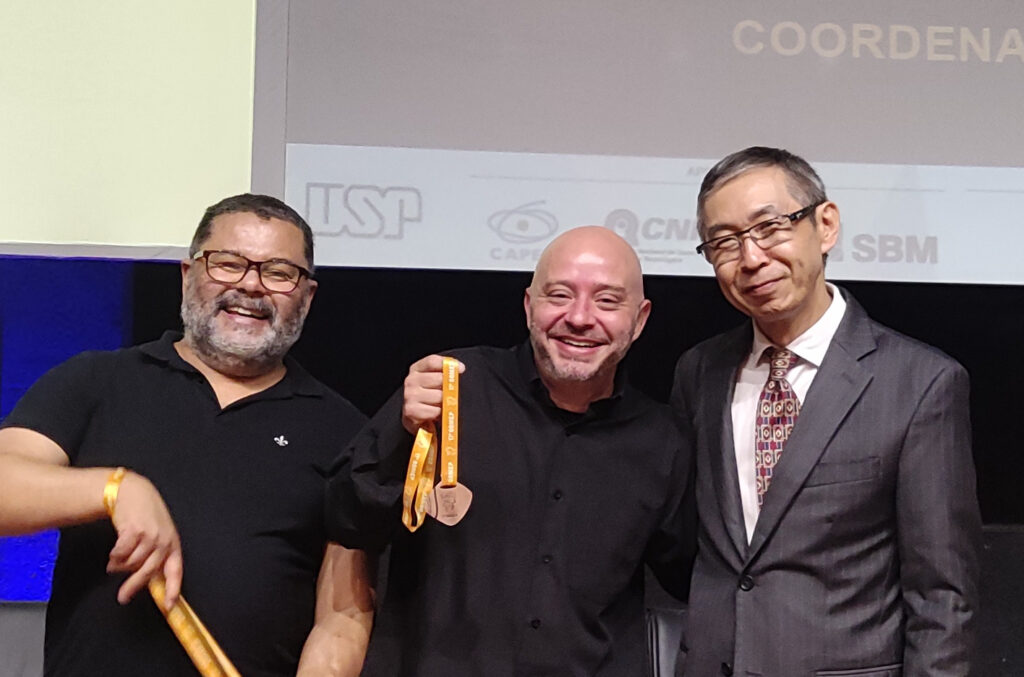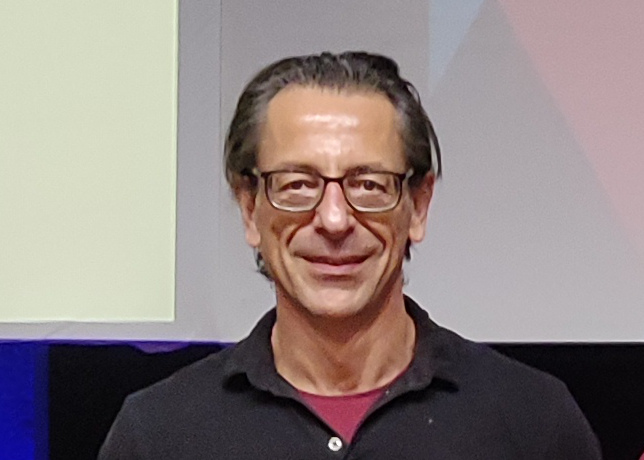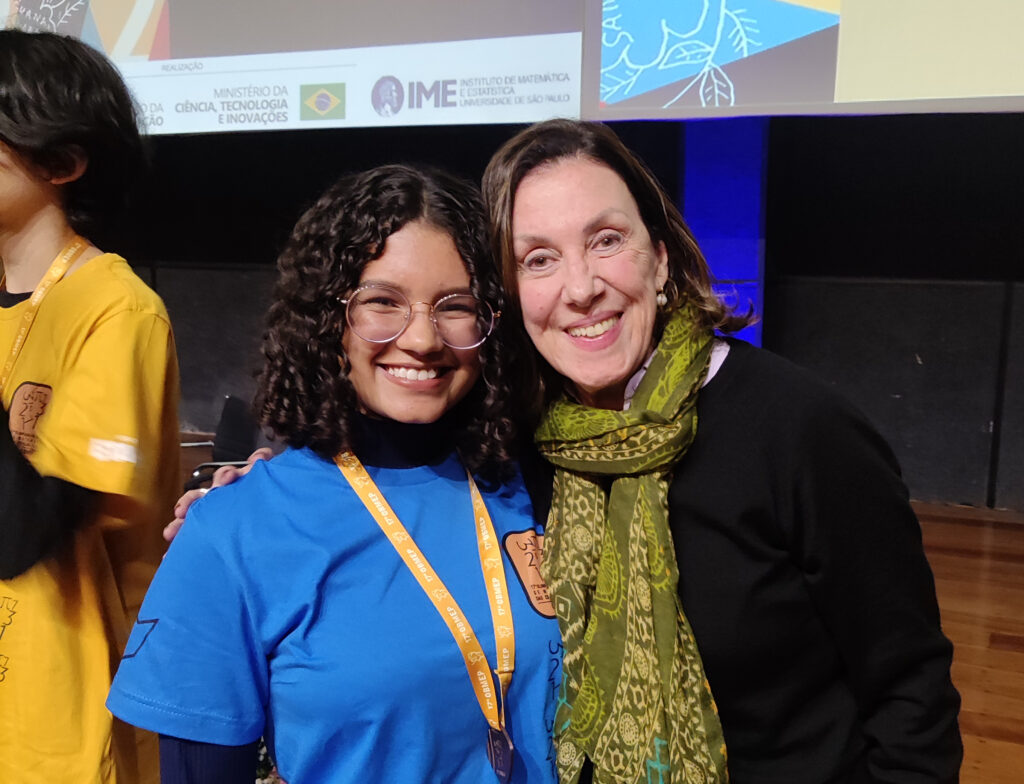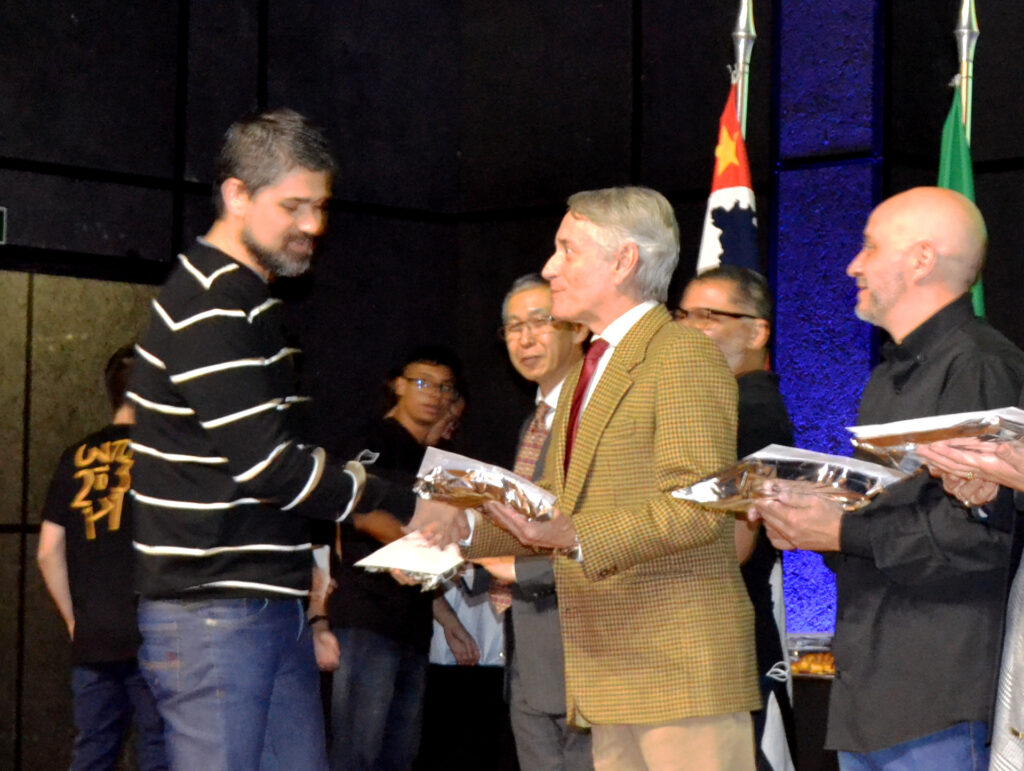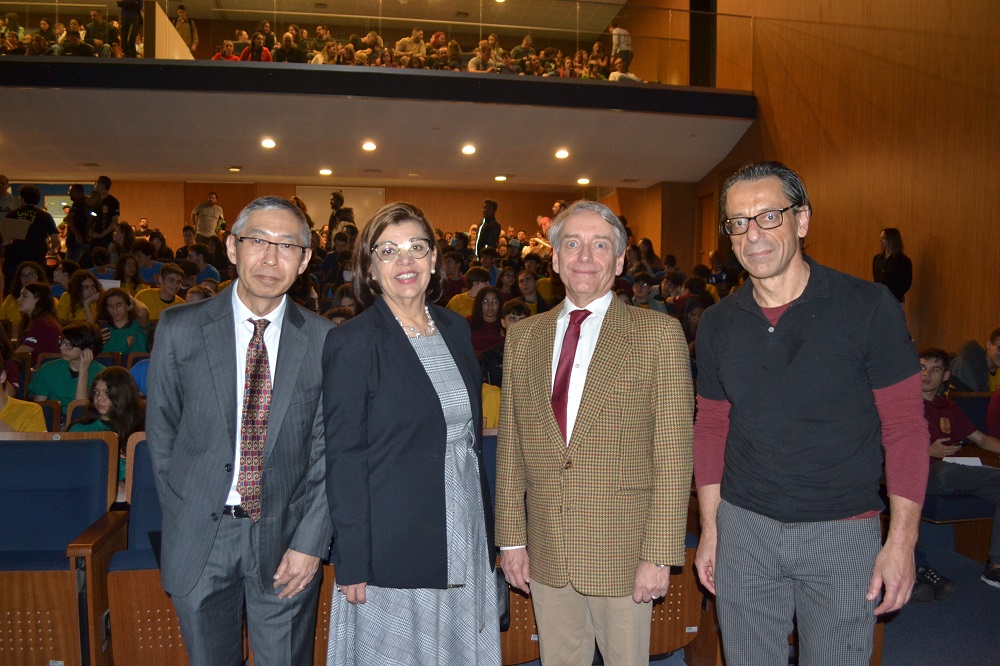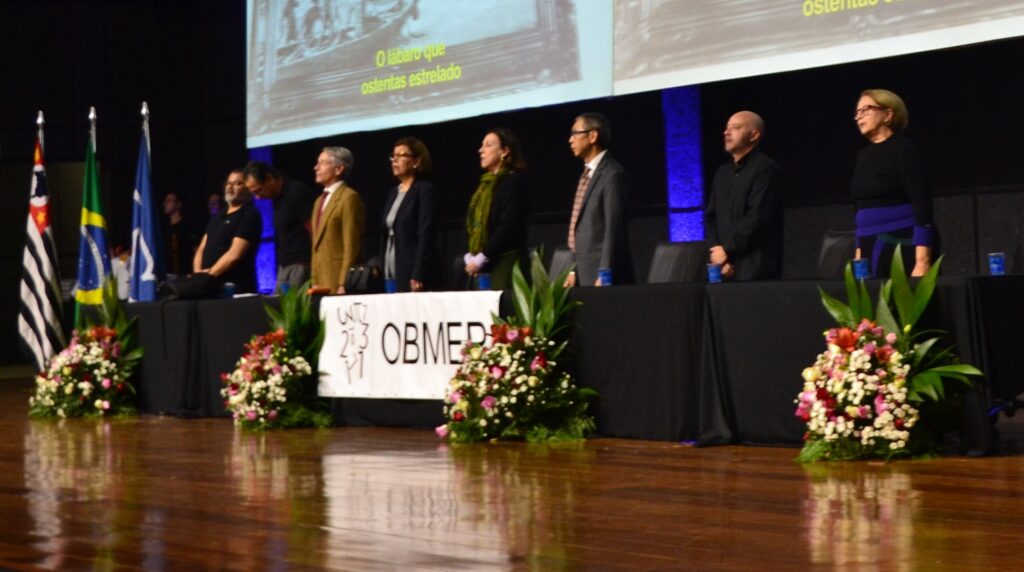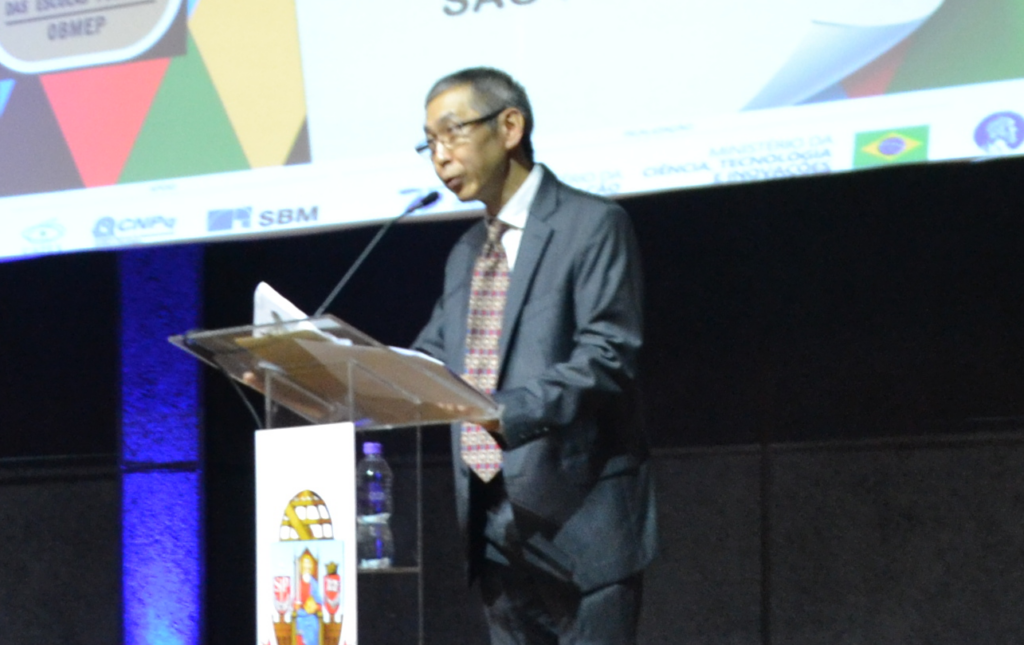The medals were awarded at the USP Center for Diffusion and Innovation, in the presence of representatives of supporting institutions and students’ families
On June 30th, the University of São Paulo hosted the regional meeting of OBMEP (Brazilian Mathematical Olympiads for Public Schools) medalists, which awarded more than 300 students, teachers and schools in the city of São Paulo for their performance in the 17th edition of the Olympics, held in 2022.
Images: Marcelo Modesto and Nathalie Rodrigues
At the meeting, which took place at the USP Center for Diffusion and Innovation, 350 gold, silver and bronze medalist students, 30 teachers and 15 schools were awarded for their performance in the 17th edition of the Olympics.
The awardees received the honors of Professors: Dr. Marli Quadros Leite, Pro-Rector of Culture and Extension at USP; Dr. Aluisio Augusto Cotrim Segurado, Pro-Rector of Undergraduate at USP; Dr. Ronaldo Fumio Hashimoto, Vice-Director of IME-USP; Dr. Paolo Piccione, President of the Brazilian Mathematical Society (SBM); Mr. Isaac Cei Dias, representative of the Secretary of Education of São Paulo State; Mr. Humberto Luiz de Jesus, representative of the Municipal Department of Education of the São Paulo city; Dr. Ana Catarina Pontone Hellmeister, Coordinator of the 7th OBMEP Regional Office in São Paulo city; and Dr. Maria Elise Esteves Lopes Galvão, Sub-coordinator of the 7th OBMEP Regional Office in São Paulo city.
The authorities present spoke briefly about the importance of recognition that the Olympics represents and dedicated their words to encouraging students, every year more diverse. In his speech, Professor Ronaldo Fumio Hashimoto, Vice- Director of IME-USP, emphasizes that “OBMEP is not just an Olympics, it is much more than that” and addresses the students directly:
It is an honor and a joy to be here with you to celebrate your achievements and recognize all the effort, dedication and talent you have shown throughout this very challenging journey to overcome challenges. These awards are testament to your work, intelligence and dedication. You proved that excellence is not a far destination, but a goal achieved with dedication and passion. Remember that success is not just the result of a competition, but an ongoing journey. Keep nurturing your passion for math and never stop dreaming high. The obstacles that may arise on the way, may arise! But be sure that you, with determination, will overcome them. IME wishes you a beautiful journey and a future full of achievements.
Professor Ana Catarina Pontone Hellmeister, Regional Coordinator of OBMEP in the City of São Paulo, dedicated her speech to thanking the support that makes the Olympics possible and gave space to the current student of the Polytechnic School of USP, Ricardo Lago, awarded in seven editions of the OBMEP and former participant of the Scientific Initiation Program (PIC) and the Master’s Scientific Initiation Program (PIC-ME).
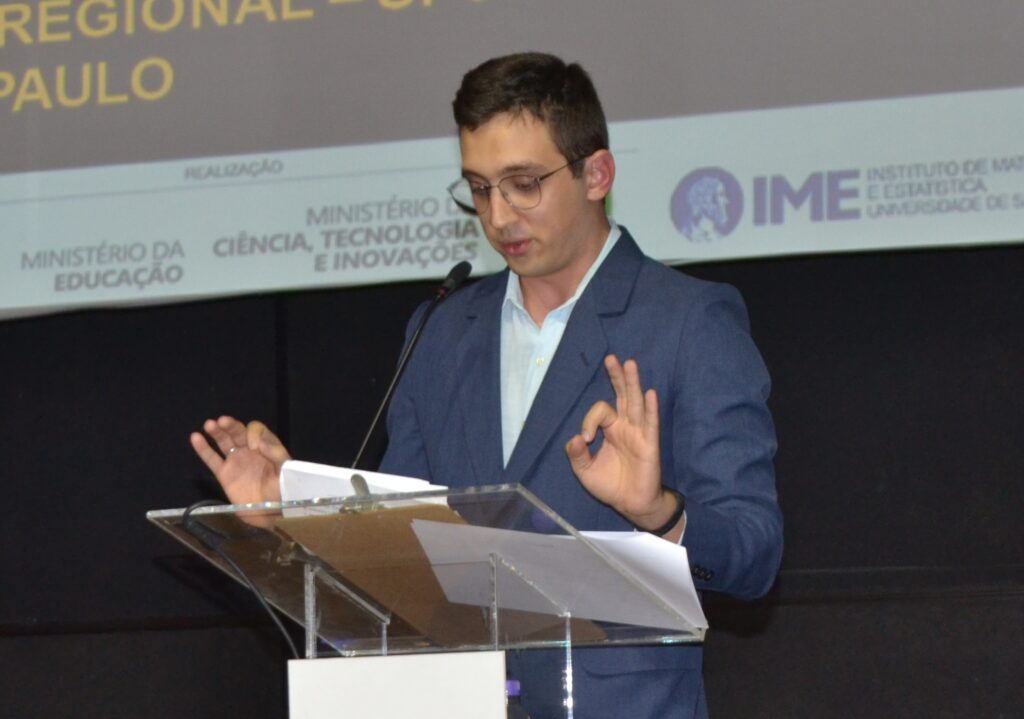
Image: Nathalie Rodrigues
My first medal I won when I was in sixth grade and it was silver. I remember that they simply put everyone in the room to take a test and then they brought the news that I had passed to the second phase. So I got my first medal, then I took the PIC. I got one more and did the PIC again. One more came and so on. I think you understand the cycle. In high school I got a scholarship to a private school and from then on I took off. I participated in many other Olympics, I won a medal [at the Olympics] in physics, I got gold at the National [Olympics] in Chemistry. But, even today, [I continue] studying here at USP’s Electrical Engineering and trying to get some money to take a double degree in France. I still say in all my interviews that the most important medal for me was that silver in 2013.
Prof. Dr. Ana Catarina Hellmeister
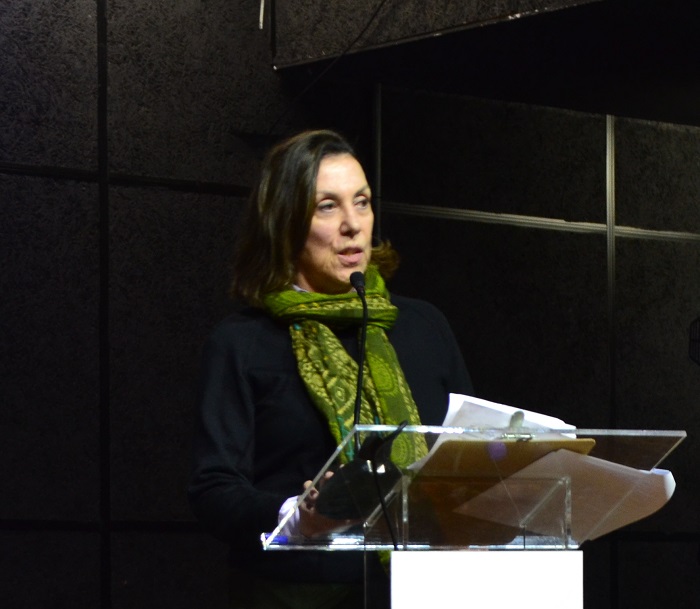
Image: Nathalie Rodrigues
Coordinator of the 7th Regional of OBMEP in the city of São Paulo since 2008, by invitation of the president of the Brazilian Society of Mathematics that year, Prof. Dr. Suely Druck.
In the initial three years of the project – 2005, 2006 and 2007 – this coordination was located in a private school in the city and I believed (and still believe) that OBMEP should be based in a public institution. Therefore, I brought this coordination to IME-USP, with the support of the Director of the Institute at that time.
The OBMEP tests are designed to identify students interested in mathematics. These are challenging questions that motivate students’ logical deductive reasoning and also their readiness to face situations that are different from those normally encountered in regular math classrooms. Students who engage with OBMEP have the opportunity to grow intellectually in all areas of knowledge. As a regional coordinator, I organize all the logistics for administering the first and second phase tests, returning these tests and then correcting the second phase tests. The correction of the tests of the first phase (multiple choice) is done in the schools, which classify 5% of the students participating in the first phase for the second phase. The logistics for the application of the second phase involves contacts with the 26 Boards of Education in São Paulo city (there are 13 from municipal schools and 13 from state schools) that helped us and still help in determining the schools that will be centers for the application of the test. .
OBMEP annually invites the 6 thousand medalist students (from all over the country) of the previous year to participate in the PIC – Scientific Initiation Program. This program lasts for 10 months and consists of meetings (or virtual meetings, if the student is far from a center) fortnightly, in which a program specially designed by OBMEP is developed. There are PIC centers all over the country, one of them being here at IME. Participating students are motivated to study several Mathematics contents more deeply, even those that are not part of the formal teaching curriculum.
Taking courses at IME (and at other USP units), several students who were awarded at OBMEP, often needy and who would not have the opportunity to study at USP – not even knowing the university environment – had this path opened by OBMEP, through the PIC.
Participation of IME
IME-USP, as one of the supporters of OBMEP, actively participates throughout its development. The institute makes its infrastructure available on Saturdays for PIC meetings for approximately 300 students. Additionally, there are currently around15 teachers who participate in the regional correction of tests for the second phase of the Olympics. In the regional coordination, professors Ana Catarina Hellmeister serve as Coordinator, Maria Elisa as Sub-coordinator, and Cristina Cerri as Coordinator of the PIC, at the IME pole.
“The entire administrative part of applying the test – logistics, hiring room coordinators and inspectors, correcting the tests is done at the IME, which provides us with a room to host the coordination of the OBMEP. IME also offers us a telephone line, furniture, etc”, remarks Prof. Dr. Ana Catarina Hellmeister. “Furthermore, it gives us space to correct the tests and computers needed to enter notes and data from participating students. Annually we correct around 14,000 tests, with the correction coordinated by me and made by professors and students of master’s and doctoral degrees at IME”.
About OBMEP
Created and carried out by IMPA (Institute of Pure and Applied Mathematics), with the support of SBM (Brazilian Mathematics Society), the competition is promoted with funds from the Ministry of Education (MEC) and the Ministry of Science, Technology and Innovation (MCTI).
Aimed at students from the 6th year of Elementary to the 3rd year of High School, OBMEP contributes to stimulating the study of Mathematics and identifying young talents in the discipline. Other objectives of the initiative are to promote social inclusion through the dissemination of knowledge and contribute to improving the quality of basic education, allowing a greater number of Brazilian students to access quality didactic material.
Check out the best moments of this event on the IME YouTube channel:
By Nathalie Rodrigues | Institutional Support Service


